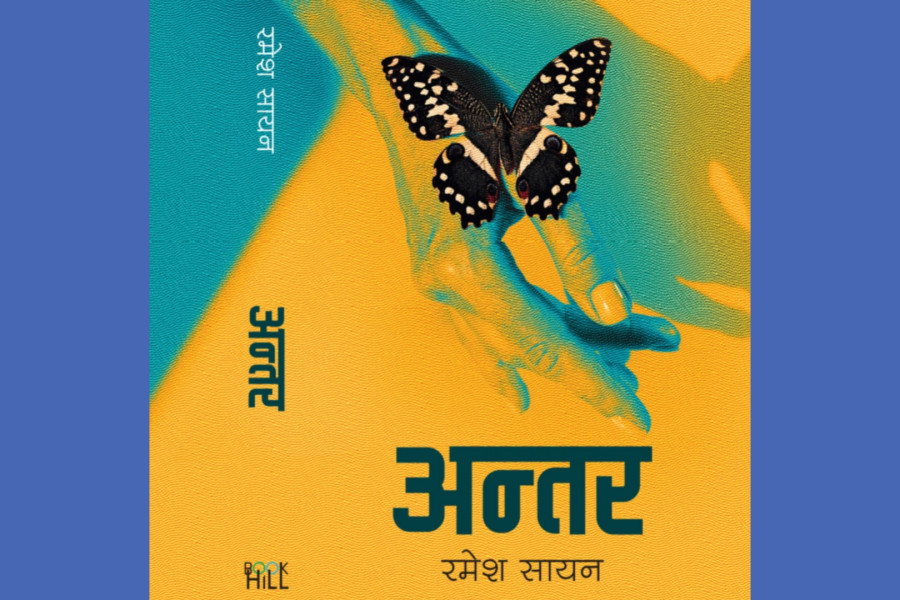Books
‘Antar’: Every identity matters
The novel follows the coming of age of a gay man, Shabda.
Ken Subedi
Ramesh Sayan’s debut novel ‘Antar’ is about reflections of a gay man, starting from his childhood to his youth. It starts with a monologue of a boy, Shabda, who has recently turned a teen and struggles with the changes in his own body. The novel’s setting at the beginning is a rural village in Nepal, and the characters are Shabda, his family members, school friends and a few villagers.
The language of the novel is lucid and simple, making it an easy read, even for high schoolers. The sentences are short, and the story moves ahead like a stream. The initial chapters recount the rural life of Nepal, where students enjoy their lives at home, with love and affection from their parents as well as the cherishable moments spent with their classmates.
Shabda, the protagonist, becomes attracted to one of his male friends Aman while in his school days. They spend all their days together, from swimming in a local canal to gossiping at night in Shabda’s house. All the while, Shabda relishes the accidental brushing of Aman’s skin to his, finding discreet ways to get close to him.
On the other hand, Aman doesn’t know anything about Shabda’s sexual orientation. He loves Shabda like a brother, a close friend.
Shabda is also liked by a girl named Anuja, who adores him, and they go to the movie theatre—spreading rumours of their tryst. Shabda adores Anuja, not because she is a woman but because she shows him kindness and appreciates him for how gentle he is.
However, he is unable to tell Anuja the truth, resulting in her harbouring romantic feelings for him. This creates a tormenting situation for Shabda, as he cannot perform his heteronormative role with Anuja.
Eventually, Shabda shifts to Kathmandu like most rural students do for their higher studies. The challenges, trauma, loneliness, and hardships experienced by such students have been vividly portrayed through the stories of Shabda during his study years in Kathmandu.
Shabda’s struggle to accept his sexuality manifests even more in Kathmandu. His suffocation of not being able to reveal his actual self is the crux of the novel. The issue that the novel has brought forth is relatively new in the contemporary Nepali literary scene.
Much of Nepal’s literature has been written through the heteronormative lens. The main protagonists are almost always straight and cis-gender. However, critical theorists like Judith Butler have challenged the absolute binarisation of genders.
The novel realistically presents the trauma, stress, inferiority complex and psychological disturbances that sexual minorities go through. In Nepal, the backwardness of society in terms of education and orthodox traditions further jeopardises their identities.
It is evident that literature regarding different sexual and gender identities should be written, published and shared to familiarise people with the lived realities of queer people.
Antar is also about Nepali society, family and friendship. It depicts the livelihood of a typical rural Nepali family and the struggles a middle-class rural family faces in life, including the journey of leaving their villages for higher education and, eventually, a better life. The friendship between Shabda and his mates is portrayed in a realistic manner.
The novel also shows the darker side of university life—especially for those living alone in the capital. They are shown to be influenced by marijuana, tobacco and alcohol. Continued loneliness and distance from their family trigger them to be habitual users of those substances, eventually leading them to poor health and degraded study habits.
When one of his college mates forces Shabda to come out, the news spreads like a bushfire, and Shabda is called a ‘chhakka’, a derogatory term for queer folks. The epilogue is satisfying as Shabda, who was previously unable to reveal his true self to his family and society, reveals so with pride at the graduation ceremony. Like Shabda, accumulating the courage to speak about one’s inner self liberates the individual and encourages people with different identities easier to co-exist.
Antar
Language: Nepali
Author: Ramesh Sayan
Year: 2023
Publisher: BookHill




 9.89°C Kathmandu
9.89°C Kathmandu










